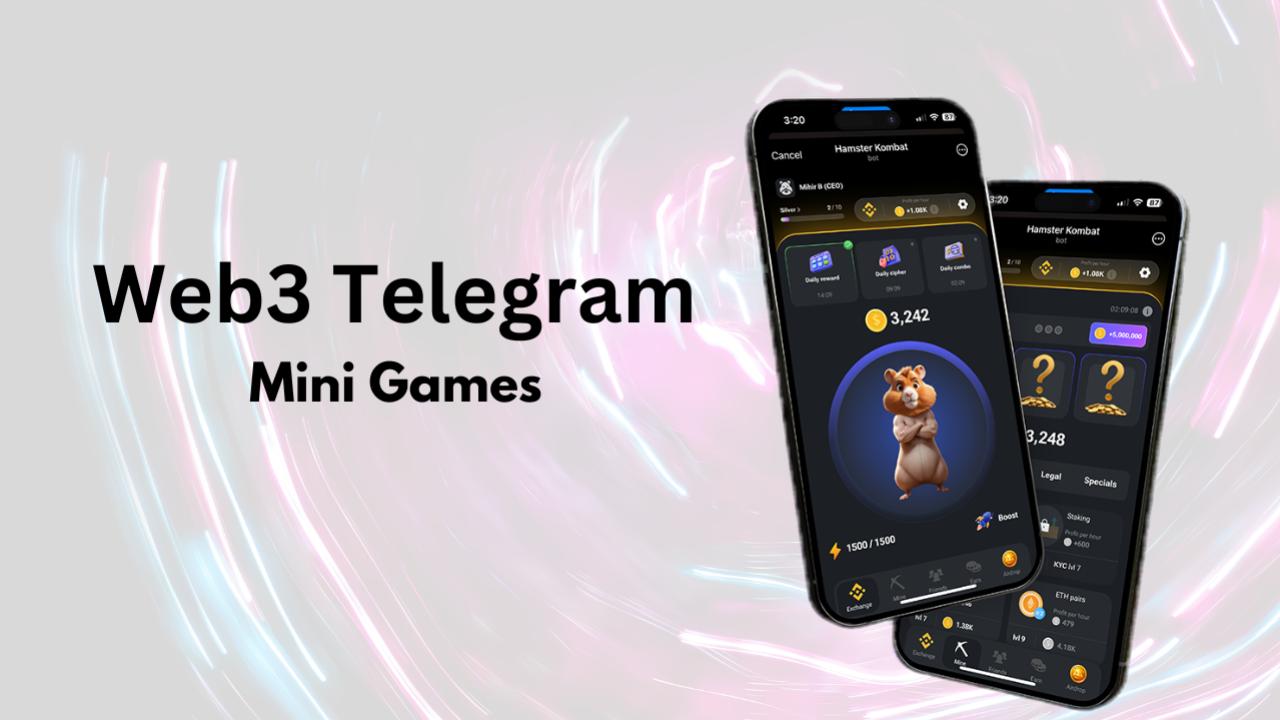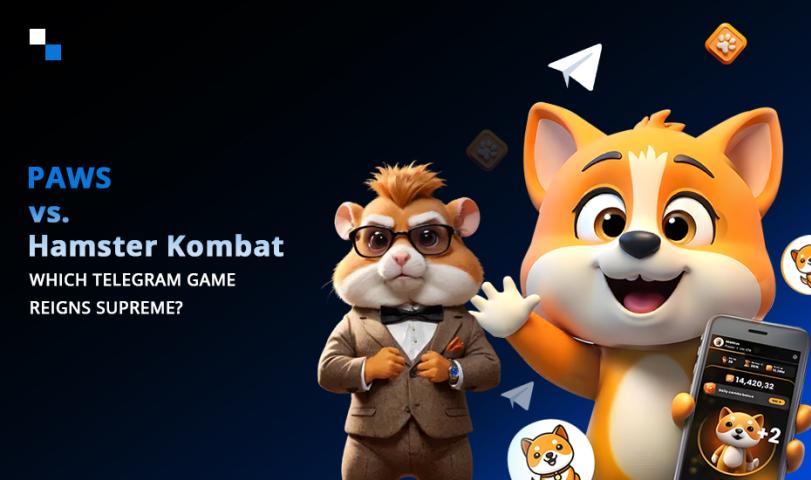Web3 technology is reshaping the online gaming landscape, and one of the most exciting developments is the rise of mini games on platforms like Telegram. These games, built on decentralized networks, bring a new level of innovation, ownership, and player interaction to the table.
Telegram has become a hub for Web3 mini games, offering a new way to engage players. The simplicity of Telegram combined with the power of Web3 is providing a fresh approach to online gaming. Let’s break down how Web3 Telegram mini games are changing the gaming world and why they are making such a huge impact.
What Are Web3 Telegram Mini Games?
To understand their impact, it’s important to know what Web3 mini games on Telegram are. These are small, bite-sized games built on decentralized networks and integrated into Telegram. Unlike traditional games, they allow players to own in-game assets, earn rewards, and even trade them with other players. All this is made possible through blockchain technology, which enables secure, transparent, and decentralized transactions.
The appeal of these games lies in their accessibility. You don’t need a high-end gaming console or a special device to play. All you need is a Telegram account and an internet connection. Plus, with Web3 technology, players get to enjoy benefits that aren’t possible with traditional games.
Why Web3 and Telegram?
Web3 introduces decentralization into the gaming world. This means that instead of having a central authority controlling the game, Web3 games are governed by smart contracts and decentralized protocols. Players have more control over their assets, and there’s more transparency in the game’s operations.
Telegram, on the other hand, is a popular messaging app with millions of users worldwide. It’s easy to use, offers real-time communication, and allows developers to create bots and mini-games that integrate seamlessly with the platform. The combination of Web3’s decentralization and Telegram’s accessibility creates the perfect environment for these mini games to thrive.
How Web3 Telegram Mini Games Differ from Traditional Games
Traditional online games are controlled by a central entity, typically the game developer or publisher. Players don’t really own the items they earn or buy in the game. If the game shuts down, those items are gone. Web3 games change that.
In Web3 Telegram mini games, assets are tokenized using blockchain. This means that when a player earns or purchases an item, they truly own it. The item exists on the blockchain, independent of the game itself. Players can trade, sell, or keep these assets as they see fit. The game doesn’t control what happens to them.
Additionally, Web3 games are built on decentralized networks, which means that they don’t rely on a single server. Traditional games often face issues like server downtimes or shutdowns. But in Web3, the game continues as long as the blockchain network is active, offering more stability.
The Role of Blockchain in Telegram Mini Games Development
Blockchain technology is the backbone of Web3 Telegram mini games. It provides the structure for secure, decentralized, and transparent gameplay. Every transaction in the game, whether it’s buying an item or trading it with another player, is recorded on the blockchain. This ensures that everything is verifiable and secure.
Developers who specialize in telegram mini games development use blockchain to create in-game assets as non-fungible tokens (NFTs). These NFTs represent unique items in the game, like skins, weapons, or avatars. Players can own and trade these NFTs, giving them true ownership over in-game assets.
Blockchain also enables play-to-earn models. In traditional games, players spend money to buy items or upgrades. But in Web3 games, players can earn cryptocurrency or NFTs by playing, which they can trade or sell. This has attracted a lot of players who are looking to earn while gaming.
The Play-to-Earn Model
One of the biggest trends in Web3 Telegram mini games is the play-to-earn (P2E) model. Instead of simply playing for fun, players can earn real rewards in the form of cryptocurrency or NFTs. This adds a whole new level of motivation for players, as they can see their in-game time turn into real-world value.
In traditional games, players often spend money on in-game purchases. But in P2E games, the tables are turned. Players earn while playing, and they have the option to cash out their rewards. This creates a self-sustaining economy within the game. Some players even make a full-time income by playing P2E games.
The appeal of the play-to-earn model is one of the key reasons Web3 Telegram mini games are gaining so much attention. It combines fun with real-world earning potential, making the gaming experience more rewarding.
Community-Driven Development
Web3 gaming isn’t just about decentralization on a technical level. It also brings decentralization to game development itself. Many Web3 games are developed with input from the community. Players get a say in how the game evolves, which features are added, and how the game’s economy is managed.
This is a major shift from traditional gaming, where decisions are made by a centralized company. In Web3 Telegram mini games, players can vote on key changes using governance tokens. These tokens give them voting power, allowing the community to shape the direction of the game.
This community-driven approach creates a sense of ownership and engagement among players. They aren’t just passive participants in the game—they are active contributors to its development. This model has led to more loyal and dedicated player bases.
The Future of Telegram Mini Games Development
The future of telegram mini games development looks promising. As Web3 technology continues to evolve, so will the capabilities of these games. Developers are already working on integrating more complex features, such as multiplayer modes, advanced token economies, and cross-game asset transfers.
One exciting possibility is the integration of different mini games into a single ecosystem. Imagine being able to earn an asset in one game and use it in another. This concept, known as interoperability, is one of the key advantages of blockchain gaming. Players can move assets across different games or even sell them on external marketplaces.
Another trend to watch is the growth of decentralized autonomous organizations (DAOs) in gaming. In a DAO-driven game, the players collectively make decisions about the game’s future. This could lead to even more community-driven innovation and development.
Why Telegram Mini Games Are Popular
Telegram mini games are popular for several reasons. First, they are easy to access. Anyone with a Telegram account can start playing, and the games are designed to be quick and fun, perfect for casual gaming sessions. You don’t need any special equipment or software, making them highly accessible.
Second, the integration of Web3 technology adds a unique layer of excitement. Players can earn real rewards, own assets, and trade them with others. This level of ownership and earning potential makes the games more engaging than traditional mobile games.
Finally, the community aspect of Telegram games is a huge draw. Players can chat with each other, form groups, and even participate in game development decisions. This social element creates a more interactive and connected gaming experience.
Challenges Facing Web3 Telegram Mini Games
While Web3 Telegram mini games offer many advantages, they aren’t without challenges. One of the biggest challenges is scalability. As more players join the games, the underlying blockchain networks can become congested. This leads to slower transaction times and higher fees.
To combat this, developers are exploring layer-2 solutions, which are designed to improve scalability. These solutions allow transactions to happen off-chain, reducing the load on the main blockchain while still maintaining security and transparency.
Another challenge is adoption. While Web3 gaming is growing, it’s still in its early stages. Many players are unfamiliar with concepts like cryptocurrency, NFTs, and decentralized networks. Educating new players and making the onboarding process easier will be crucial for the long-term success of Web3 games.
The Economic Impact of Web3 Games
The economic impact of Web3 Telegram mini games is significant. The play-to-earn model has already created new income streams for players worldwide. In some countries, players are earning more from gaming than from traditional jobs. This is especially true in regions where the local economy is struggling.
Web3 games are also creating new opportunities for developers. Telegram mini games development is becoming a lucrative field, with developers earning money through token sales, transaction fees, and in-game economies. Additionally, the decentralized nature of these games means that independent developers have a chance to compete with larger studios.
The in-game economies of Web3 games also have the potential to grow into larger ecosystems. As more players join and more assets are created, the value of these in-game items could rise, leading to thriving secondary markets.
Conclusion
Web3 Telegram mini games are revolutionizing the online gaming space by bringing decentralization, true ownership of assets, and the play-to-earn model to the forefront. The integration of blockchain technology with the simplicity of Telegram creates an engaging platform where players can not only enjoy games but also earn real rewards and trade valuable in-game assets.
These mini games empower players with control over their items, foster community-driven development, and introduce new ways to monetize gaming. Despite some challenges like scalability and adoption, the future of this sector looks promising. As more players and developers embrace Web3 technology, the demand for innovative games will continue to rise.
If you're looking to tap into this growing trend, partnering with a telegram mini games development company can be the key to creating a successful and engaging gaming experience. These companies specialize in harnessing the potential of blockchain to deliver unique, decentralized mini games that are changing how we play online.











